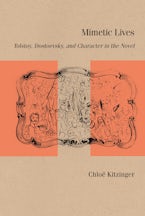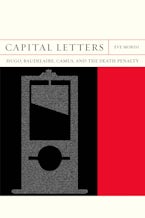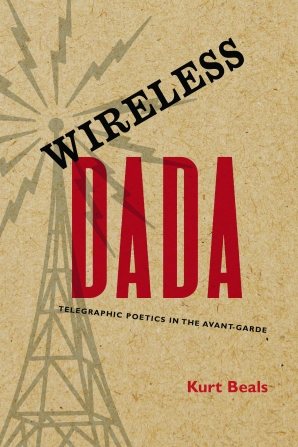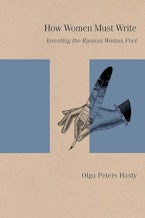LITERARY CRITICISM / Modern / 19th Century
Showing results 1-10 of 17
Filter Results OPEN +

Genre, Race, and the Production of Subjectivity in German Romanticism
Exposes German Romanticism’s entanglements of aesthetic philosophy with racialized models of humanity
Theater of Capital
Alisa Zhulina shows how canonical fin-de-siècle playwrights interrogated the meaning of capitalism, staging economic questions as moral and political concerns and challenging contemporary socioeconomic theories within the boundaries of bourgeois theater.
Mimetic Lives
Studies in Russian Literature and Theory
What makes characters seem real? This book explores the ways Tolstoy and Dostoevsky created the illusion of autonomous characters, through techniques that paradoxically hindered the writers’ ambitions for the novel as a genre.
At the Limit of the Obscene
At the Limit of the Obscene: German Realism and the Disgrace of Matter examines the fear of materiality in German‑language realist and postrealist literature.
Dostoevsky and the Ethics of Narrative Form
Studies in Russian Literature and Theory
This book investigates how Dostoevsky’s interest in the moral dimensions of reading and writing ties into his novels, foreshadowing current debates in the study of narrative ethics.
Capital Letters
Capital Letters sheds new light on how literature has dealt with the death penalty by uncovering the unexpected critical dialogue in which Victor Hugo, Charles Baudelaire, and Albert Camus engaged.
Wireless Dada
Wireless Dada: Telegraphic Poetics in the Avant-Garde is a literary critical study of the telegraph’s effect on the poetics of the Dada movement. This book tracks the influence of the technological and social transformations brought about in the nineteenth and early twentieth centuries on experiments in poetry.
How Women Must Write
Studies in Russian Literature and Theory
Olga Peters Hasty’s How Women Must Write provides an insightful analysis of the emergence of women poets in Russia during the late nineteenth and early twentieth centuries, a period of quickly shifting social, political, and cultural conditions.
The Virginal Mother in German Culture
Lauren Nossett’s The Virginal Mother in German Culture explores the contradictory obsession with female virginity and idealization of maternal nature in Germany from the late eighteenth to the early twentieth century.
Thackeray
Thackeray: The Sentimental Cynic chronicles British novelist William Thackeray's ambivalent attitudes toward society and traces his conduct during the major crises of his life in terms...

Genre, Race, and the Production of Subjectivity in German Romanticism
Exposes German Romanticism’s entanglements of aesthetic philosophy with racialized models of humanity
Theater of Capital
Alisa Zhulina shows how canonical fin-de-siècle playwrights interrogated the meaning of capitalism, staging economic questions as moral and political concerns and challenging contemporary socioeconomic theories within the boundaries of bourgeois theater.
Mimetic Lives
Studies in Russian Literature and Theory
What makes characters seem real? This book explores the ways Tolstoy and Dostoevsky created the illusion of autonomous characters, through techniques that paradoxically hindered the writers’ ambitions for the novel as a genre.
At the Limit of the Obscene
At the Limit of the Obscene: German Realism and the Disgrace of Matter examines the fear of materiality in German‑language realist and postrealist literature.
Dostoevsky and the Ethics of Narrative Form
Studies in Russian Literature and Theory
This book investigates how Dostoevsky’s interest in the moral dimensions of reading and writing ties into his novels, foreshadowing current debates in the study of narrative ethics.
Capital Letters
Capital Letters sheds new light on how literature has dealt with the death penalty by uncovering the unexpected critical dialogue in which Victor Hugo, Charles Baudelaire, and Albert Camus engaged.
Wireless Dada
Wireless Dada: Telegraphic Poetics in the Avant-Garde is a literary critical study of the telegraph’s effect on the poetics of the Dada movement. This book tracks the influence of the technological and social transformations brought about in the nineteenth and early twentieth centuries on experiments in poetry.
How Women Must Write
Studies in Russian Literature and Theory
Olga Peters Hasty’s How Women Must Write provides an insightful analysis of the emergence of women poets in Russia during the late nineteenth and early twentieth centuries, a period of quickly shifting social, political, and cultural conditions.
The Virginal Mother in German Culture
Lauren Nossett’s The Virginal Mother in German Culture explores the contradictory obsession with female virginity and idealization of maternal nature in Germany from the late eighteenth to the early twentieth century.
Thackeray
Thackeray: The Sentimental Cynic chronicles British novelist William Thackeray's ambivalent attitudes toward society and traces his conduct during the major crises of his life in terms...










